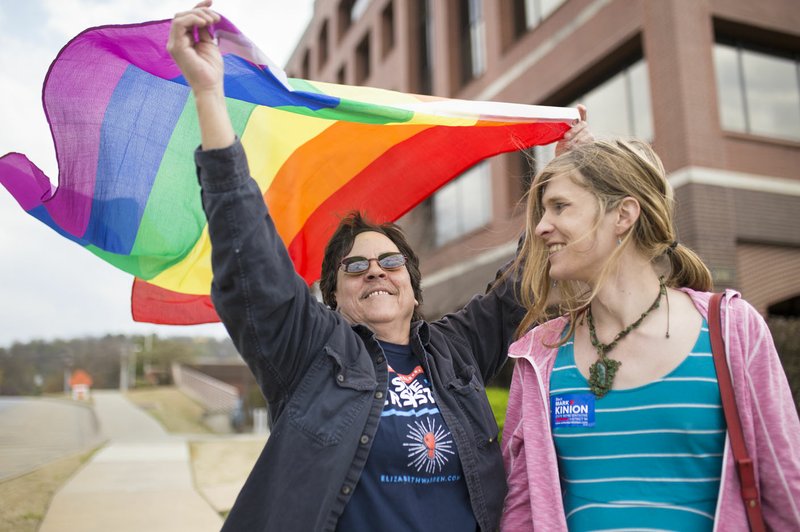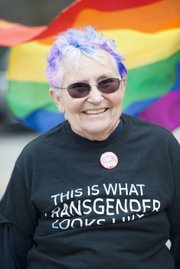FAYETTEVILLE -- Dozens gathered around noon Saturday at the Washington County Courthouse to represent transgender lives and uplift their voices, according to organizers.
"We're a minority in the community and have to gather together to be able to stand. There is a sizable trans population in NWA," said Jewels Hayes, spokeswoman for the group Intransitive. "We live here. We love our towns and cities. We are Arkansans. We want to be represented and heard. We want to be there for the many trans people that feel silenced or secluded."
Groups
Groups involved in Trans-gender Day of Visibility, Fayetteville
Intransitive: www.face-book.com/i…, @ intransitivenwa on Instagram
NWA Center for Equality: nwaequality.org, located at Arthur Beeghly LGBTQ Resource Center at 179 N. Church Avenue, Suite 101
Source: Staff report
The event -- the first official one put on by Intransitive, held to coincide with International Transgender Day of Visibility -- was full of smiles and chants. However, conversations turned serious when discussing the life-or-death issues that transgender people can face.
Less than 550 miles away in Baton Rouge, La., a black transgender woman was shot dead Monday. Amie Tyrae, 28, is the seventh reported homicide of a transgender woman in 2018 in the U.S.
Between 25 and 28 transgender people were reported killed last year, the highest number in a decade, according to the Trans People of Color Coalition and Human Rights Campaign. Most were black transgender women in southern states.
Federal data on the number of the transgender population is lacking, but a 2015 U.S. Transgender Survey was the largest survey examining the experiences of transgender people in the United States, with 27,715 respondents nationwide. The survey was conducted by the National Center for Transgender Equality in summer 2015. Of those who responded, 222 were Arkansas residents.
About 50 percent of transgender people reported physical abuse, and the majority -- 72 percent -- of the victims of hate violence homicides were transgender women, according to a 2013 Hate Violence Report from the National Coalition of Anti-Violence Programs.
Several transgender women at Saturday's event said they have been physically and sexually harassed while living in Northwest Arkansas but they think it's safer than other parts of the state and country.
"But it depends on your situation," Hayes said. "You could be walking down the street and get catcalled or a guy could come up and start flirting with you and then realize you're trans and say, 'I'm going to kick your ass.'"
Some transgender people in Arkansas move to Fayetteville because it is seen as a more inclusive city, many said. Others come from bigger cities because the cost of living is lower, said Evelyn Rios Stafford, NWA Center for Equality board member.
"There are services here and doctors that actually provide trans healthcare, which isn't the case in a lot of other parts of the state," Stafford said. "It's not a perfect place. There are still issues to deal with, for example, affordable housing. Prices are rising in Fayetteville, and the trans community has a a disproportional number of people in poverty."
Nationally, one in five -- or 20 percent -- transgender people have experienced homelessness and one in eight have been evicted because of being transgender, according to the 2015 U.S. Transgender Survey.
While it's difficult to accurately estimate the total number of Americans who have experienced homelessness, about 6.3 percent of the population is living in poverty and are at risk or are homeless, according to the National Law Center on Homelessness.
In Arkansas, 27 percent of transgender people have experienced homelessness at some point and 22 percent of respondents experienced some form of housing discrimination in the past year, such as being evicted from their home or denied a home or apartment because of being transgender, according to the 2015 U.S. Transgender Survey.
Stafford said the disproportion can come from discrimination and also the medical costs of transitioning/gender reassignment surgery, which insurance companies tend not to cover.
Fayetteville has a higher degree of legal protections for transgender people through the Civil Rights Ordinance passed in 2015, Stafford said. The ordinance was about equal access to employment and housing and is still being challenged in court.
Activist groups, such as Intransitive, and individuals in the region are striving to bring support to transgender people in the community and awareness of the many issues transgender people face. These intersect with other issues related to race, income and gender in the U.S., they said.
For example, Hannah McBroom is an artist who is working on a series on transgender visibility in Northwest Arkansas.
"I've been painting individuals from the NWA community and painting them live," she said. "We'll spend two or three hours in my studio and we'll talk. It ends up being a bridge between me and the person. I'm not prescribing an identity to them, I start painting and focusing on who they are, as people."
NW News on 04/01/2018




